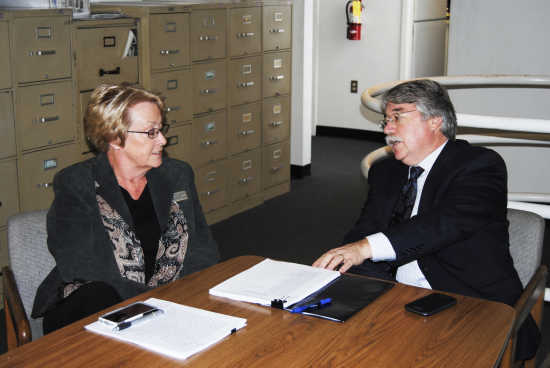Zoeller takes pre-emptive strike on ACA

Health care has been a predominant issue in the media for several months now, but most of the focus has been on individual health care. Indiana Attorney General Greg Zoeller and his staff are focusing on how the Affordable Care Act (ACA) is affecting state government and the branches under it, including school systems.
Carey Milner, Cloverdale School Corporation superintendent, and Zoeller recently sat down and talked with the Banner Graphic about the ACA, its effect on the schools in Indiana and recent lawsuit the schools and state have brought against the federal government.
Putnam County schools have been grappling with the issue of either providing health insurance for all of their employees or cutting non-certified employees, some include instructional assistants, custodians and cafeteria workers, down to 29.5 hours a week.
Cloverdale, South Putnam and Greencastle school corporations have all chosen to cut these employees' hours. North Putnam still has its non-certified employees at 35 hours.
The Putnam County schools have recently been asked to become part of a lawsuit that might help gain an exemption from a stipulation in the ACA that has employers with 50 or more employees either providing health insurance or forcing to cut employees' hours. If the schools do not comply with the stipulation, they are subject to a tax penalty from the IRS. Bose McKinney and Evans LLP, a private law firm that has brought together 39 schools in the state for the suit, is heading this lawsuit.
While a private firm is representing the schools, the attorney general's office is beside the 39 schools in the lawsuit. Zoeller's office is also focusing on the implications to the state government.
"Before being subjected to draconian IRS tax penalties, the state and 39 schools ask the federal court whether they are under federal taxing authority like private sector employers," Zoeller said.
Milner believes that the tax penalties that could be levied on the schools are unreasonable.
If the schools or any business were to not abide by ACA they could be looking at a $2,000 fine for each person employed. Milner and Zoeller said that this could mean fines of upward of $500,000 for a school corporation, and for the state government that could mean of $56 million.
While those fines would hurt many of the schools, Milner was also concerned about the economic impact it would have on the families that were affected and what it could mean for the students.
With hours going from close to 40 down to 29.5, Milner estimated a collective loss of $44,000 a year at least for Cloverdale employees. It also means that those who work with students are spending less time with them.
Several of the other school boards looked at the impact of not having these people on staff or having to shuffle them around. Jill Summerlot of the North Putnam School Board was very worried about the impact on special needs students when the board first visited the ACA issue many months ago.
"There's no good way to go about this," Milner said, speaking about the tough decisions all the schools are making. "(We're) trying to make the best of a bad situation."
On the state level Zoeller believes that the schools situation made a great example for the lawsuit. At the state level the lawsuit is looking for an answer on whether or not a sovereign state should be held accountable to the tax penalty since a state is considered a non-profit, Zoeller explained.
"Our state should be protected as is constitutionally guaranteed from federal government overreach under our American system of federalism," Zoeller said. "The participation of so many school corporations in the challenge reflects mutual concern that this principle has been undermined by the IRS's actions."
He also stated in a recent article that he believes the lawsuit will set a precedent that goes to the fundamental relationship between states and the federal government.
Oklahoma has its own lawsuit going against the ACA in a general sense, while Indiana has narrowed its field of focus on answering what the law means and how it affects state government.
Zoeller said the lawsuit focuses on Indiana and no other states would be partnering with it.
"This is a declaratory action used to bring the courts into the mix," Zoeller explained.
He went on to state that this is a respectful way to test the new law and that it was a common occurrence. Zoeller also believed that this pre-emptive lawsuit would work in the schools' favors for when, not if, a school gets caught under the tax penalty.
"The financial implication is huge," Milner said. "We could have someone (personnel) slip through."
Milner also stated that other superintendents were worried an employee would slip through just due to the paperwork involved.
Zoeller believed that the lawsuit should go through fairly quickly and be in appeals court by this spring and a final decision by 2015.
Until that time the schools of Putnam County will continue doing what they can.
"We will manage but we would just like to have the people back," Milner said.
